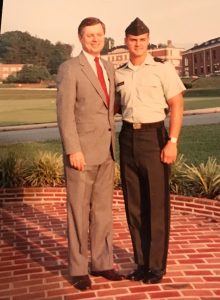Recently our country celebrated Veterans Day. Thank you to all of the veterans who may be reading this article. It was my honor to serve as both an enlisted soldier and later as a commissioned officer in the US Army Infantry. Although I received some leadership training as a Boy Scout, my first real taste of leadership was in the military. FM 22-100 Military Leadership, is the Army’s basic manual on leadership and was my first formal introduction to leadership training.
While the contexts of military operations and small business management may seem worlds apart, the core principles of effective leadership transcend boundaries. In this article, I’ll explore how these military leadership tenets can be adapted and applied to small business leadership.
What is Leadership?
“Leadership is the process of influencing others to accomplish the mission by providing purpose, direction, and motivation.” – FM 22-100
Whether you are leading troops on the battlefield, employees during the work day, or a client through a strategy session I think this definition of leadership as “influence” is applicable, so let’s go with that. To better understand how military leadership principles can be effectively translated into the business realm, let’s delve into the Army’s fundamental leadership framework: Be, Know, Do.
Be, Know, Do: The Foundation of Leadership
The Army’s leadership framework is built on three simple, yet profound, words: Be, Know, Do. This framework contains the essence of what it means to be a leader in any field.
Be: This involves character traits and values. Integrity, responsibility, and respect are not just military virtues; they are equally vital in the business world. As a business leader, embodying these qualities sets a tone for your company culture and builds trust among your team and clients.
Know: Knowledge in the Army covers technical skills and tactical proficiency. In business, this translates to understanding your market, your products & services, and the intricacies of managing a business. Continuous learning and adaptation are key to staying competitive and effective.
Do: This is about taking action and setting the example. In small business, this means not just delegating tasks but also being willing to roll up your sleeves and get involved in all aspects of the business.
Decisive and Confident Leadership
In the military, decisiveness and confidence are critical in high-pressure situations. Similarly, in business, making timely decisions confidently—even in the face of uncertainty—can be the difference between success and failure. However, this doesn’t mean rushing into decisions without proper consideration; it means gathering the necessary information quickly, evaluating options, and then confidently making a decision.
Adaptive and Flexible Approach
Just as the military must adapt to rapid changes on the battlefield, businesses must be agile in response to market dynamics. The ability to pivot strategies, embrace new technologies, and innovate processes is crucial for small businesses to thrive. Equally important is the ability to multitask, maintaining focus on immediate tasks while keeping an awareness of the overall situation.
Mission First, People Always
The Army’s principle of putting the mission first while taking care of its people is incredibly applicable to small business. Your business goals (the mission) are important, but achieving these goals is only possible through your team (your people). Fostering a supportive, inclusive, and motivating work environment is as essential in business as it is in the military.
Clear Communication and Effective Teamwork
Clear, concise communication is a cornerstone of military operations and is equally important in business. Effective communication ensures that everyone understands their roles, responsibilities, and the business objectives. Teamwork, built on the foundation of effective communication, is vital for achieving business goals.
Ethical Leadership and Responsibility

Commissioning day June 1989 as a new Second Lieutenant. Pictured here with my father CPT (RET) Ed Domaleski, a Vietnam Veteran. Photo/Jean Domaleski
The military emphasizes ethical leadership and taking responsibility for actions. In business, ethical considerations and social responsibility not only enhance your brand’s reputation but also contribute to a sustainable business model.
Yes, we used to joke that “there’s a right way, a wrong way, and the Army way”. Not everything in the military is ideal, nor is civilian life. On the whole, FM 22-100 was a great introduction to leadership when I was a young Lieutenant. It continues to be a good reference nearly 35 years later. Reflecting on these insights, it becomes clear that the principles outlined in FM 22-100’s definition of leadership offer valuable lessons beyond the military context.
FM 22-100 offers helpful leadership guidance that can be applied in business and public service. It emphasizes the importance of influencing others, not just through authority, but by instilling purpose, direction, and motivation. Leaders are tasked not only with achieving specific goals but also with enhancing the capabilities and wellbeing of their organizations and teams. This holistic approach to leadership underscores the balance between accomplishing objectives and nurturing the development of individuals and the organization as a whole, making it a universally applicable and enduring model of effective leadership.
What are some of your favorite leadership books or references?
[Joe Domaleski, a Fayette County resident for 25 years, is the owner of Country Fried Creative – an award-winning digital marketing agency located in Peachtree City. His company was the Fayette Chamber’s 2021 Small Business of the Year. Joe is a husband, father of three grown children, and proud Army veteran. He has an MBA from Georgia State University and enjoys sharing his perspectives drawing from thirty years of business leadership experience. Sign up for the Country Fried Creative newsletter to get marketing and business articles directly in your inbox. ]

